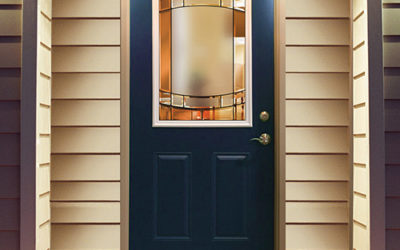
Replacing a door? Here’s What You Should Know
Hollow Core VS. Solid
Which is better? Each has their own advantages and disadvantages. Let’s start with
Solid Doors
- The major advantage to solid core doors is they are more sound deadening than a hollow core door.
- Another advantage is they are stronger. They will take some abuse without much more than just scratches.
- The disadvantage is the weight. They are heavy and hard to handle all the way from the lumber yard to your house. The weight of the door can cause some drywall cracking if the door gets slammed hard enough. So if you plan to have any door slamming competition with your spouse or one of your kids; you may not want a solid core door.
- Another disadvantage is with more wood, more warping can happen. Take care to always apply a finish to all 6 edges (top, bottom, edges and both sides) of the door. This will help keep the moisture content of the door more consistent.
Hollow Core
So what about hollow core doors? They normally have a honeycomb cardboard material in the center of the door. I know it sounds oversimplified, but they are surprisingly very strong and are much lighter to handle. Because there is less actual wood in the door there is usually less warping. However, special care must be taken when applying the finish on your hollow door.
I have seen doors freshly painted and then stood at an angle to dry. The door gets wet from the paint and becomes somewhat flexible. It will dry and possibly keep the shape of when it was wet. Always try to support the door as not to cause a bow or twist while the finish is drying. You must still be sure to finish all 6 edges.
- The biggest advantage is the cost. You can get very impressive looking doors for much less than solid wood doors. Door manufacturers have made great strides in producing very realistic replicas.
- The major disadvantage is probably its strength. If impacted hard enough, you can pierce the veneer skin, leaving a hole in the door.
Whether your project is a new door install or a door replacement; now you can make your decision with confidence. You can select from a wide selection of doors at either Lowe’s or Menards.
Removing a Door
Removing a door can sometimes look like a daunting task. If it’s broken down into small steps, the project becomes much simpler to complete. Interior and exterior doors are installed in much the same way. So removing them is often quite similar. The easiest method is to remove the door from the frame. There are two ways to do this.
The first is to remove the hinge pins.
Do this by using a hammer and a nail, such as an 8d or 16d. It may take a surprisingly hard hit to pop it up. Place the nail under the hinge and strike upward. Take a good look at the hinge, make sure it’s not a pin that is welded or fixed to the hinge.
If it is, you will not be able to remove the pin itself.
Which leads to the second option of removing the screws from the hinges at the door or jamb location. Once the pins or hinges are removed, grab hold of the door handle, open the door, and pull it off the hinges.
Set the door aside and get ready to remove the trim and frame.
Removing the Trim
You will need the following to remove the trim:
- Hammer
- Drill or Screwdriver
- Pry bar
- Reciprocating Saw
- Utility Knife
If the trim is painted or caulked to the
Tap the pry-bar between the door frame and trim. Loosen the nails as work your way around the door. Be careful, as many of the nails will stay in the trim and they are sharp. Wearing a pair of gloves would be a good idea. Complete this step on both sides of the door.
With the trim removed, insert a reciprocating saw blade into the narrow opening between the jambs and wall (rough opening). Most likely you will encounter nails or screws that were placed through the door jamb and into the wall framing. A helper to hold the frame may be a good idea for this step, as the door frame has the possibility to fall out once the nails are cut off.
Remove the jamb, and clean up any residual caulking, insulation, or protruding fasteners. That’s it! Door removed. Now that you are ready to install the new door you have picked out; check out our door installation instructions.
If you’d like more details about what the process of installing a door entails, you can read our detailed guide.
Following these simple principals, replacing a door can be a quick and easy process.

Door Installation Has Never Been Easier
- Install 5X Faster
- Eliminate Shims
- Perfect Fit Every Time





0 Comments